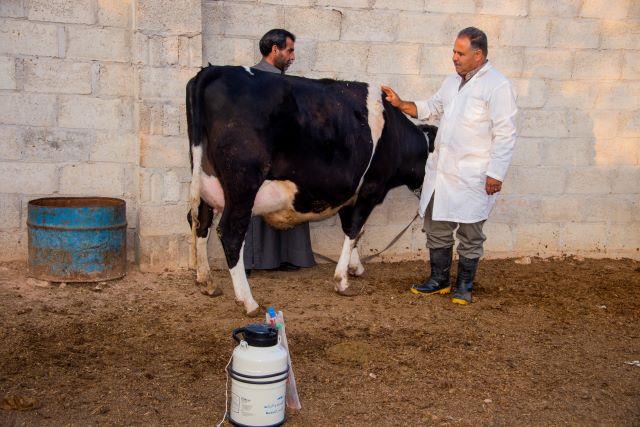Batoul Saad improves her livelihood with FAO’s support

©©FAO/Mazen Haffar
The conflict in Syria has driven up the price of animal fodder and other livestock inputs, and quality feed is not always available on the market. The cost of animal feed represents 70 percent of livestock production costs, with vulnerable herders being particularly impacted by price increases. Many livestock keepers have been forced to sell their animals, leaving them without one of their main livelihood assets.
In several areas of the country, FAO is working to increase feed availability and boost livestock productivity. Batoul Saad, a 32-year-old woman and a mother of five young children, lives with her family in Al-Hader village in rural Aleppo. Batoul and her family are among the 6 000 beneficiaries who have been reached by FAO in Al Hassakeh, Aleppo and Deir Ez-Zor Governorates. Through the FAO smallholder support programme, FAO has inseminated livestock breeders cows and provided them with silage, a type of fodder enriched with nutrients that improves the health and fertility of cows. The goal of this intervention is to enable small-scale livestock breeders to become self-sufficient and productive to sustain their livelihoods.
“We own two cows that used to produce an average of 10 litres of milk per day combined, barely enough to meet our family’s needs,’’ said Batoul. “The silage we received from FAO has a high value of nutrients, and I noticed our cows’ appetites improved. The daily milk produced has increased remarkably–now our two cows together can produce up to 22 litres per day. Before, we were unable to earn an extra income from the milk produced, now given this amount of fresh milk produced daily, I can keep some for my family’s consumption and sell the surplus to neighbours. I also noticed that not only has the quantity of milk improved, but so has its quality and it has a greater fat content. Now I can make tasty labneh, duberky (traditional types of creamy yoghurt) and cheese.”
Since December 2020, FAO has provided improved semen straws for artificial insemination to ensure that that the cows’ offspring produce a high quality and quantity of milk. FAO’s artificial insemination activity is already contributing to improved pregnancy rates among the cows, which will lead to a better and more stable economic situation for dairy producers.
Batoul shared that “in previous years, my husband and I thought about selling our cattle, as we were unable to inseminate them. The veterinarians informed us about the lack of quality semen straws, and those that were available in the market were low quality. We did not want to risk our cattle’s health, but with FAO’s semen straws accredited by veterinarians, both of our cows are now pregnant from the first insemination attempt, it worked! We are happy and excited to receive the new calves this year,” she added. “I have a family and it is my responsibility as a mother to ensure they have good nutrition and to meet their needs,” stated Batoul.
FAO supports the most vulnerable rural families to enhance their livelihoods and food security with integrated, well-designed interventions and programmes to help people them become self-sufficient and productive. Ensuring food accessibility and availability for everyone is key to achieving Zero Hunger in Syria.
